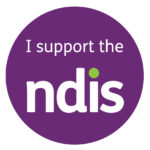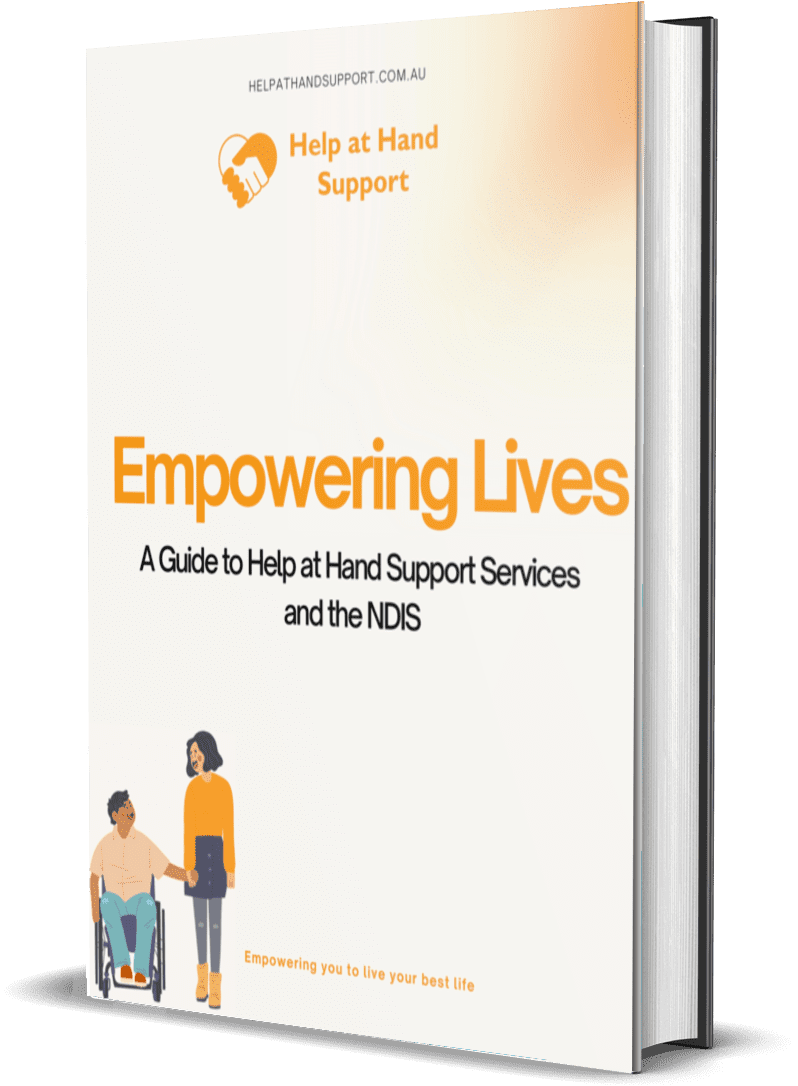What are Allied Health Services in Melbourne
Allied Health Services in Melbourne are NDIS-funded therapy supports that help people build independence, improve daily participation, and enhance overall wellbeing through evidence-based treatment.
These services are provided by qualified allied health professionals, including physiotherapists, occupational therapists, speech pathologists, psychologists, dietitians, podiatrists, and exercise physiologists.
Depending on your needs, support may be delivered in your home, within community settings, at dedicated therapy clinics, or through secure telehealth sessions for greater accessibility.
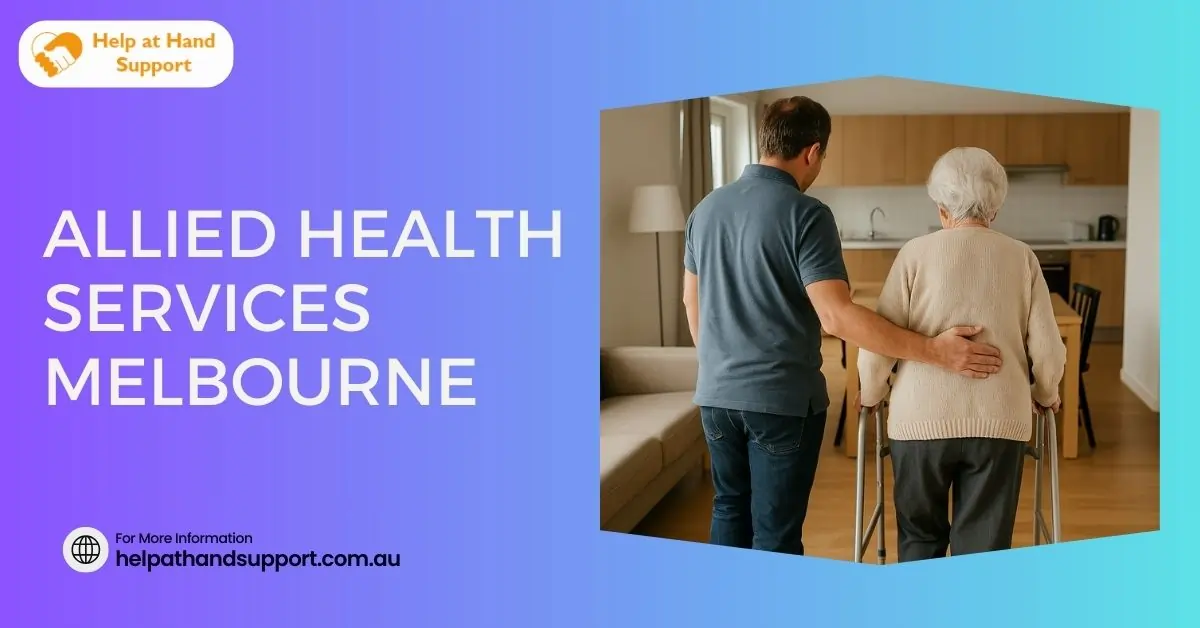
Who Benefits from Allied Health Support?
Allied Health support in Melbourne benefits children, teenagers, and adults who need structured therapy to improve mobility, communication, behaviour, nutrition, and independence.
The benefits of allied health support are listed below.
- Post-hospital recovery patients need rehabilitation and ongoing pain management.
- People develop daily living skills such as dressing, showering, cooking, and maintaining home safety.
- Individuals with communication difficulties requiring speech therapy, AAC, or swallowing support.
- Participants experiencing anxiety or behaviour challenges who need psychological or behavioural support strategies.
- Those with nutrition concerns require personalised diet plans, mealtime assessments, or texture-modified diets.
- People with mobility and foot health issues need orthotics, gait training, or falls prevention programs.
- Individuals seeking to improve their physical capacity through exercise physiology for enhanced strength, balance, and endurance.
What Allied Health Therapies We Provide in Melbourne
Help at Hand Support offers allied health services to Melbourne participants, providing access to a comprehensive therapy team that eliminates the need to manage multiple providers or coordinate different disciplines independently.
Help at Hand Support offers a full range of therapies that support independence, well-being, and participation, as listed below.
- Physiotherapy – increases mobility, reduces pain, prescribes equipment, delivers hydrotherapy, prevents falls, and assists with post-operative rehabilitation.
- Occupational Therapy (OT) – completes functional capacity assessments, builds activities of daily living (ADL) skills, recommends home modifications, trials assistive technology, and prepares SIL/SDA functional reports.
- Speech Pathology – develops communication and literacy, supports social interaction, introduces AAC (augmentative and alternative communication) devices, and manages swallowing and mealtime safety.
- Psychology – designs behaviour support plans, reduces anxiety, provides CBT-informed therapy, and conducts functional behaviour assessments to improve daily routines.
- Dietetics – creates tailored nutrition plans, assists with weight management and diabetes care, and provides mealtime management, including texture-modified diets.
- Podiatry – delivers nail and foot care, manages pressure areas, conducts gait assessments, and prescribes orthotics to improve stability and mobility.
- Exercise Physiology (EP) – builds strength, balance, and endurance through disability-specific exercise programs and supports safe gym or community-based fitness transitions.
Each therapy is designed not only to deliver clinical care but also to achieve NDIS goals. The following section outlines the practical applications of Allied Health.
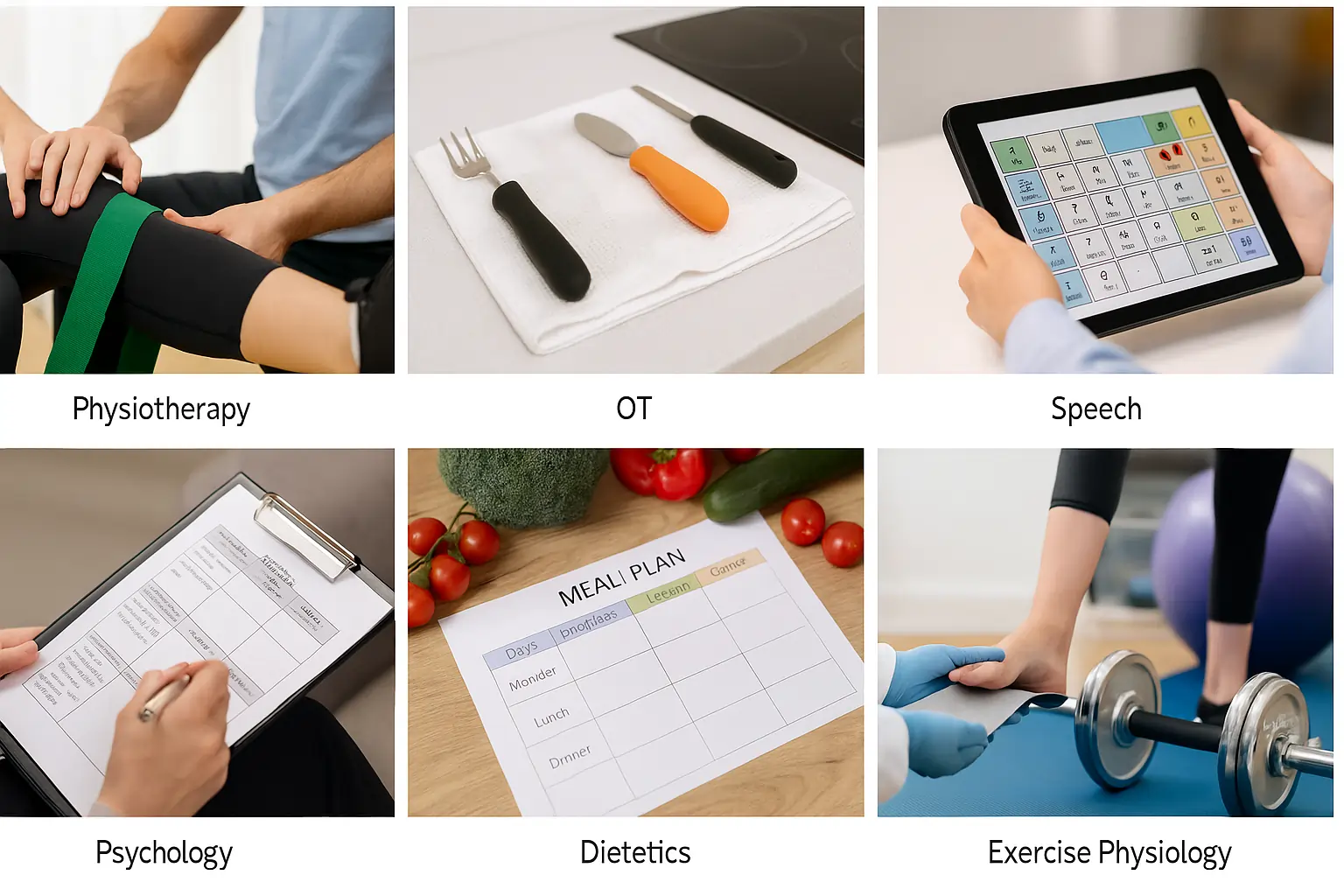
How Allied Health Helps You Reach Your NDIS Goals
Allied Health therapy in Melbourne helps participants achieve NDIS goals by translating clinical strategies into measurable outcomes that increase independence, safety, and daily participation.
Examples of Allied Health outcomes are listed below.
- Physiotherapy – supports safer transfers, stronger balance, and improved mobility to reduce falls and injuries.
- Occupational Therapy (OT) – develops independence in daily living tasks such as meal preparation, dressing, showering, and home safety.
- Speech Pathology – builds clearer communication, enhances swallowing safety, and provides AAC (augmentative and alternative communication) systems for effective interaction.
- Psychology – reduces anxiety, increases confidence, and delivers behaviour support strategies that improve routine and participation.
- Dietetics – strengthens nutrition, assists with chronic disease management, and ensures mealtime safety through tailored diet plans.
- Podiatry – promotes foot health, corrects gait patterns, and prevents pressure injuries for better mobility.
- Exercise Physiology (EP) – boosts strength, endurance, and balance to support community access and lower the risk of falls.
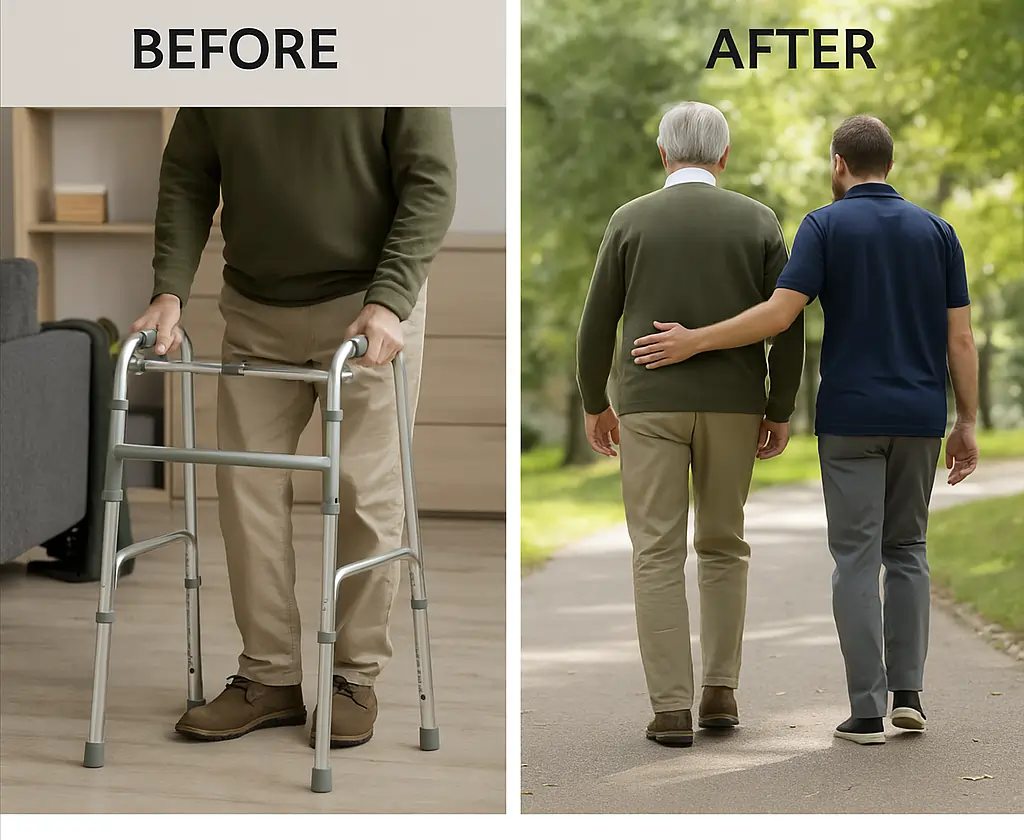
Do you provide home visits, clinics, and telehealth
Yes, our allied health services are available in homes, clinics, community venues, and via telehealth across Melbourne.
This flexibility means therapy is delivered in the environment where it will be most effective. Telehealth options provide continuity when travel is difficult or schedules are tight.
How Allied Health is Funded Under the NDIS
Allied Health services in Melbourne are funded through NDIS Capacity Building budgets, primarily for Improved Daily Living and Health and Wellbeing.
Funding covers assessments, assistive technology trials, home modification reports, therapy sessions, and progress reviews.
Help at Hand Support coordinates with Support Coordinators and Plan Managers to ensure services are aligned and budgets are on track.
Why Choose Help at Hand Support for Allied Health Services in Melbourne?
Help at Hand Support is trusted for Allied Health Services in Melbourne because we deliver a complete multidisciplinary team, local coverage, and NDIS-aligned therapy that achieves measurable outcomes.
Help at Hand Support therapists provide home visits, clinic sessions, and secure telehealth across Greater Melbourne, ensuring flexibility and accessibility.
We coordinate closely with Support Coordinators and Plan Managers to ensure budgets are on track and services are aligned with participant goals.
Every plan is evidence-based, person-centred, and designed to build independence in daily life.
Frequently Asked Questions
What is included in Allied Health therapy?
Allied Health therapy in Melbourne includes professional assessments, tailored interventions, home practice programs, and progress or review reports that support NDIS plan goals.
Can you work with my Support Coordinator and Plan Manager?
Yes, we collaborate with Support Coordinators and Plan Managers to align funding, track budgets, and ensure therapy reports meet NDIS requirements.
How many sessions are needed?
Session numbers vary based on your NDIS goals, therapist recommendations, and available funding, with regular reviews to measure progress.
Do you provide services for children and adults?
Yes, we deliver age-appropriate Allied Health services for both children and adults, with family and carer education included for consistent support.
Do you recommend equipment and assistive technology?
Yes, our therapists trial assistive technology, provide reports for NDIS funding applications, and offer training to ensure safe and effective use.
Combine Allied Health with NDIS Plan Management in Melbourne
NDIS Plan Management in Melbourne helps you manage budgets, pay provider invoices, and track funding so your Allied Health therapies run smoothly without disruption. Pair your therapy supports with streamlined finance administration using our Plan Management Melbourne service.
Our plan managers handle invoice processing, budget utilisation reports, and monthly statements while working with Support Coordinators and therapists to ensure services like physiotherapy, OT, speech, psychology, dietetics, podiatry, and exercise physiology are funded and delivered on time.

